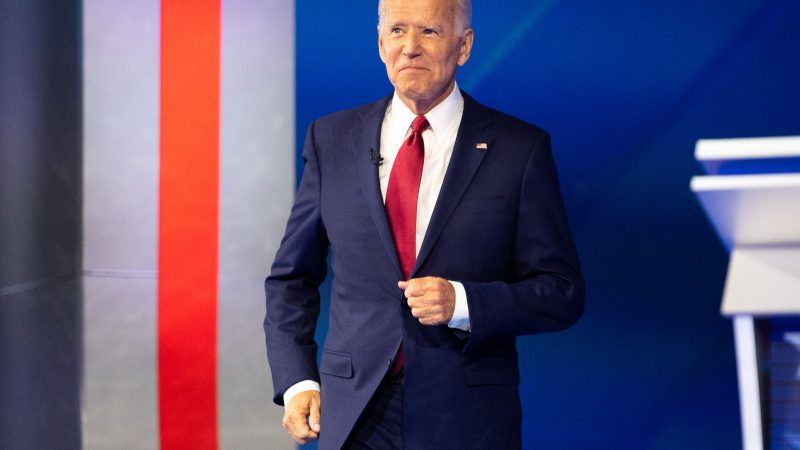There's Only 1 Democrat Talking About the Constitution, and It's (Shudder) Joe Biden
The Democratic presidential field is not interested in your puny restraints on the executive branch.

Let us not now pretend that Joe Biden brought anything like coherence to Thursday night's Democratic presidential debate in Houston.
At some point near the exhausted end of the nearly three-hour affair, the 76-year-old former vice president blurted out within the space of a few seconds the sentences "Make sure that kids hear words," and "I know Maduro." Confronted with the Obama administration's unlovely record on deportation, he just lied about it: "We didn't lock people up in cages. We didn't separate families." And at the close of one particularly free-associative word salad that hopped from the Afghanistan surge to Pakistani bases to weapons inspectors to the authorization for the use of force in Iraq, the perennial presidential contender simply concluded, "I said something that was not meant the way I said it." We feel you, Joe.
Yet the Democratic front-runner also played a starring role in what was arguably the most clarifying exchange of the night. Moderator David Muir, addressing the cavalier gun-grabber Sen. Kamala Harris (D–Calif.), asked her to address Biden's recent assertion that "There's no constitutional authority to issue that executive order when they say 'I'm going to eliminate assault weapons,'" because, "you can't do it by executive order any more than Trump can do things when he says he can do it by executive order."
"Well, I mean," Harris began, failing to suppress a smug laugh, "I would just say, 'Hey, Joe, instead of saying no we can't, let's say yes we can!"
As the crowd hooted and applauded, Delaware's favorite son attempted to interject: "Let's be constitutional! We've got a Constitution." Ha ha, what?
There were many things missing from this third Democratic presidential debate—a straightforward defense of free trade, say, or any notion that trillion-dollar federal deficits are unsound in year nine of an economic expansion. But perhaps the most striking absence was any sense from Biden's nine challengers on stage that there are, or should be, constraints on the executive branch carrying out the domestic policy whims of the Democratic electorate.
Harris, as is her wont, expressed the will to power most blatantly. "The idea that we would wait for this Congress, which has just done nothing, to act, is just—it is overlooking the fact that every day in America, our babies are going to school to have drills, elementary, middle, and high school students, where they are learning about how they have to hide in a closet or crouch in a corner if there is a mass shooter roaming the hallways of their school."
It is apparently pedantic to point out in 2019 America that waiting for legislatures to make laws (and for executives to sign them) is how this particular governing system was designed, but here we are. (I would further add that active-shooter drills at public schools, including my daughter's pre-K that I just found out yesterday, are a purely local choice, in addition to being asinine.)
The United States for the last century, and particularly the past two decades, has been mutating from a states-based political architecture to a kind of never-ending national crisis overseen by an ever-expanding executive branch. Citizens can't name their city councilor or state senator, but they sure as hell know which president or would-be commander in chief they hate most. There isn't a local problem that doesn't merit a federal response, whether it's President Donald Trump contemplating homeless sweeps in Los Angeles or Democrats in Congress forever going on about the water crisis in Flint, Michigan.
The federal government spends just 8 cents of every K-12 education dollar in this country. (That may well be 8 cents too many, but leave that aside for the moment.) Listening to the Democrats debate on Thursday, you'd think that we were electing a new president of public schools.
Sen. Elizabeth Warren (D–Mass.) wants a wealth tax to pay for "universal childcare for every baby age zero to five, universal pre-K for every 3-year-old and 4-year-old in this country," in addition to raising the wages "of every childcare worker and preschool teacher in this country, [and] cancel[ing] student loan debt for 95 percent of the folks who've got it."
Harris wants to spend $2 trillion just on historically black colleges and universities. (For comparison, that's twice as much as the initial price tag on the Affordable Care Act.) Sen. Bernie Sanders (I–Vt.) vows that "every teacher in America" will make "at least $60,000 a year." Biden sees that $60,000, and also triples the federal Title I budget, to $45 billion a year.
None of which was quite enough for Julián Castro.
"I also believe," the former Housing and Urban Development secretary said, "that we have to connect the dots to uplift the quality of life to invest in housing opportunity, to invest in job opportunity, to invest in community schools that offer resources like parents able to go back and get their GED, and health care opportunities, and those things that truly ensure that the entire family can prosper."
The candidates spoke, with varying levels of persuasion, about the fierce urgency of deposing Donald Trump and rebuilding an American political consensus whose fracturing made a Trump presidency possible. But staring into the face of an executive they despise, their imaginations rarely strayed beyond a transparent desire to seize the scepter of power and just wield it differently.
Joe Biden is a rusty weather vane who has lost several miles per hour off his fastball. And he might just be the only plausible Democratic nominee to realize that a president can't, and shouldn't, be king. God help us all.

Show Comments (106)